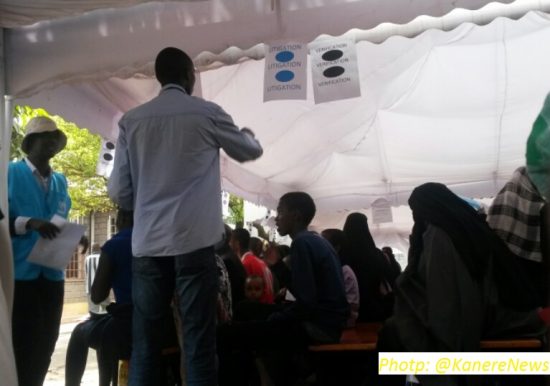A unified refugee verification exercise in Kakuma was meant to collect refugees’ data
By KANERE’s News Desk
UNHCR’s new Biometric Identity Management System (BIMS) was scheduled to begin in Kakuma refugee camp on the 6th September. This didn’t happen because arrangements were not made in time but it finally kicked off on the 26th of September. Progress was held up in the first few weeks as UNHCR had newly employed unqualified clerks.
According to UNHCR, the purpose of the exercise was to gather data from families and individuals for the refugees residing in Kakuma and the new settlement Kalobeyei.

Some refugees refused to go through the exercise because of security issues. The political refugees who have been stacked in the camps for decades felt the biometric identity management system could eventually risk their individual security as data and identity are being shared with third parties.
“If my personal information and location are identified, then my life will be in danger.” A refugee who refused to expose his nationality said at the verification’s field post one in the camp.
Some of the refugees who believed that the biometric identity management system might potentially risk their safety stated that they mistrust the systems within the UNHCR operation in Kakuma.
“Some of these so called protection lawyers are the ones who victimise political refugees, as opposed to spies who hunt refugees in exile.” A refugee who wished to remain anonymous told KANERE.
The process emerged with new techniques and sophisticated software machines that record fingerprints and iris scans. This aroused greater worries among the camp residents as to why their fingerprints were scanned including the iris scanning. “This is quite unique and we feel concerned about the security issues for the refugees.” Somali refugee leaders told KANERE at field post two.
Reasons why the verification was rolled out were not clear to the camp residents. UNHCR failed to communicate the actual purpose of the biometric census thus resulting in tension over why the digital census was being made compulsory.
More than 200 refugee workers including the interpreters and users were there to help the process run more smoothly but there were protests over unequal payment for equal work. Interpreters had to assist the clerks in data entry due to the confusion and disorder caused by unqualified clerks employed by UNHCR.
In each field post there are about 30 – 40 Kenyan nationals casually employed for the verification exercise and about 25 – 35 refugee workers. The work of the national staff was to enter the data into the system during the interviews. Once a family’s data has been collected, their information is captured and updated online in the database.
The refugee staff, including translators, foremen and forewomen, felt the pay was not relevant to the amount of work they do per day as they were allocated ksh 500 ($5) per day while Kenyans who are on a wage basis earn ksh 6,000 ($600) per day during the exercise, which goes on for at least three months.
Subsequently, refugees’ individual essential data are shared with the Kenya government or third parties for the purposes of assistance according to UNHCR. However, the question raised by many refugees is: “What are the refugee’s right to privacy and to refuse to share data?”
The exercise is expected to end in January, 2017.

6 replies on “Refugee Verification Exercise”
Why refer Nationals staffs unqualified yet they underwent thorough training that prepared them for the above mentioned exercise?
The verification exercise was successful despite all the challenges. We should be congratulating the Team.
The verification exercise was full of challenges. For some reason there’s been problem of illiteracy by staff from UNHCR, some of those workers only underwent a kind of preliminary workshop and they were not qualified for the work while the guards demands money in-order to allow a refugee or family at the verification centers.
I saw the guards taking money from refugees families with my own eyes during the verification process.
these people commenting nonsense here should keep away there selfishness comments as the matter of facts the exercise was successfully conducted n each staff deed well job as expected of him/her although there were challenges…they worked..
Hey Lynho, you should learn to respect other people’s comments. There are no selfishness in speaking reality of fraud and all bad treatment we as refugees.